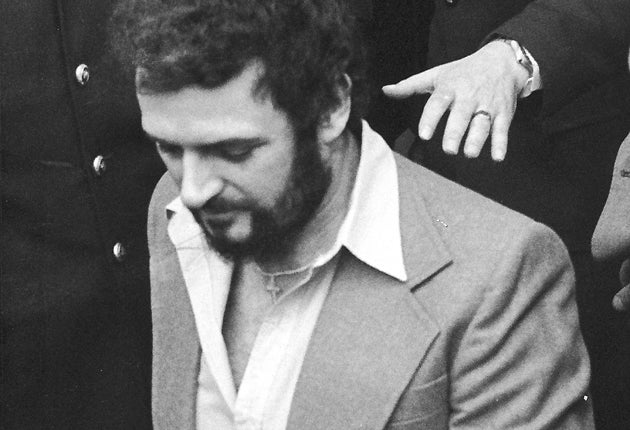'Ripper' Peter Sutcliffe begins legal bid for parole

Peter Sutcliffe, the Yorkshire Ripper, today began a bid for release from prison.
His application to have a tariff set which could lead to parole was launched at the High Court in London.
A judge lifted a cloak of anonymity thrown over Sutcliffe, 63, as he conducted a preliminary hearing and gave directions for the tariff-setting exercise.
Previously referred to as "P" to protect his identity, a question mark remains over whether Sutcliffe will have to spend the rest of his life behind bars.
Now known as Peter Coonan, the lorry driver from Bradford was convicted at the Old Bailey in London in 1981 for the murder of 13 women, and seven counts of attempted murder, in Yorkshire, Greater Manchester and Lancashire.
He is currently being held in Broadmoor top security psychiatric hospital after being transferred from prison in 1984 suffering from paranoid schizophrenia.
Today Mr Justice Mitting, sitting in London, was deciding what form the tariff setting hearing should take, and what evidence should be admitted.
The judge was told there was new expert evidence on Sutcliffe's psychiatric state which could help his case for release on licence.
At the outset of the hearing the judge took away Sutcliffe's anonymity, saying: "It is now common ground this is part of the criminal process and must therefore proceed in the defendant's own name.
"The press are at liberty to report the fact that these proceedings concern Peter Sutcliffe/Peter Coonan."
Paul Bowen, appearing for Sutcliffe, indicated there had been an application to continue keeping his identity secret, but said: "We are no longer pursuing that application."
The Prime Minister said in February last year it was "very unlikely" Sutcliffe would be released.
It was on July 5, 1975, just 11 months after his marriage, that he took a hammer and made his first attack on a woman.
Sutcliffe believed he was on a "mission from God" to kill prostitutes - although not all of his victims were - and was dubbed the Yorkshire Ripper because he mutilated their bodies using a hammer, a sharpened screw driver and a knife.
He has spent nearly all of his years in captivity at Broadmoor after being diagnosed as mentally ill, but refused treatment until 1993 when the Mental Health Commission ruled it should be given forcibly.
Mr Justice Mitting later refused an application on Sutcliffe's behalf for fresh psychiatric evidence to be admitted as part of the tariff-setting exercise.
But he said it would be considered in relation to his conduct post-sentence.
At the centre of the move was a November 2006 medical report by his treating doctor at Broadmoor, Dr Kevin Murray.
The central issues addressed were Sutcliffe's state of mind at the time he committed the crimes and at the time of the trial and also his subsequent progress in hospital.
The judge said Dr Murray had considered the material available at trial, the views of colleagues expressed since and also the treatment prescribed and its effect.
He said so far as the views of his colleagues were concerned Dr Murray stated they were unanimous in supporting his own view that from a clinical perspective "the verdict of the court was wrong".
In his report, Dr Murray had stated the "blunt and firm conclusion" it was his opinion that verdicts of guilty to murder in 1981 were wrong.
If verdicts of manslaughter on the grounds of diminished responsibility had been accepted by the prosecution or returned by the jury then the appropriate sentence would have been a hospital order without limit of time.
The treatment prescribed to Sutcliffe "has had in Dr Murray's view very considerable success", said the judge.
Since 1993 he had been "relatively responsive to treatment", leading to a conclusion that "so long as treatment continues he should be regarded as posing a low risk of re-offending".
Subscribe to Independent Premium to bookmark this article
Want to bookmark your favourite articles and stories to read or reference later? Start your Independent Premium subscription today.
